Liz Wardley: Opportunities well earned
Published on November 7th, 2019
by Craig Leweck, Scuttlebutt Sailing News
It’s easy to be impressed by Liz Wardley. She’s got nearly a million offshore miles, has done all the famous races, speaks with that joyous Australian accent, and is… drum roll… humble, almost self-deprecating, and all within her 5-foot-1 package.
Being a female, and small at that, her three Volvo Ocean Races demonstrate what’s possible with hard work, and now she finds herself in a position to empower others as skipper of the Maiden.
Yes, the same 58-footer that Tracy Edwards skippered with the first all-female crew in the 1989-90 Whitbread Round the World Race, had a movie made about the experience, and now is on a worldwide tour to promote, fundraise for, and facilitate the education of girls.
I sat down with Liz in San Diego where the Maiden team was visiting before they headed south for the Panama Canal and Caribbean.
How old are you now?
I’m 39. I’m going to be turning 40 on this trip. I worry what the crew is going to do to me?
Well, they don’t know you well yet; maybe you’ll get a break.
I hope so.
But you’ve witnessed a lot, and it’s not that you’ve set out to change the world; you just set out to create an opportunity for yourself, to pursue what you loved.
When I first started sailing, it was literally because I loved it, and I left school at 15 years old because I wanted to see how far I could go in sailing. And then I did my first Volvo Ocean Race in 2001-02 when I was 20, because that was just a massive adventure. And why not? I didn’t know anything about it, really.
Then during that race I kind of learned what else was going on in the world of offshore racing. Because growing up in Papua New Guinea, then getting your first work in Australia, you don’t know what’s out there. But suddenly I’m in France with the Volvo Ocean Race, and my eyes get opened.
I’m seeing Mini Transat boats and Figaros and people sailing around on their own in 60-foot boats. And the whole world just opened up with possibilities, and I wanted to try it all, and slowly but surely getting there.
And getting opportunities, being a female sailor, what was that like?
I was definitely always viewed as a woman sailor, and not only that, but a pretty small one, so even more useless. But I never ever took no for an answer. I always just bulldogged my way through things, and as I’m quite a shy person as well, it was always a big struggle to try and find the right person who would take me for a ride. So in the end, I had to start creating opportunities for myself.
So at a young age, I managed to find a bit of sponsorship in Australia, and we bought a boat. We did a lot of racing around the coast of Australia, and I was the skipper. I had no right to be a skipper at that age, but it was the only way to get opportunities. So think it’s just that stubbornness, and the more people said no, the more I wanted to do it.
I get a sense you’re not afraid to do whatever is needed to get done.
No. No. Not at all.
So you invested in yourself.
I always knew that I was, because of my upbringing, not that sailor who had won a heap of medals in a dinghy and aspiring to be an Olympian, and I’m the first person to say that I’m no tactician, but I can do a million other things. I always knew I had to have other skillsets to make me a better pick.
So I did a sail-making apprenticeship. I went and worked for free for engine and hydraulic mechanics. And then when the Volvo Ocean 65s were doing a refit after the 2014-15 race, I was the first one knocking at the door for a job, just to make myself indispensable for the next race. So I’m doing all that sort of stuff. I’m never sitting there waiting for the phone to ring. I’m always trying to make the next thing happen.
And yet, with all this immense experience, are you still hindered by gender when it comes to opportunities?
That’s a very tough question. You still hear a lot of people saying that there’s no opportunities out there. But for me, that’s a very, very broad thing to say, because opportunities are kind of what you make of them.
You could take a not-so-great opportunity and turn it into an amazing opportunity by going in there and just showing what you’re capable of, or trying to turn it into something else. So I’ve taken some pretty crappy jobs in the past, not just because I’ve had nothing else to take, but because I’ve seen an opportunity there in the future. And so sometimes you got to walk before you can run.
There’s women that came before you, but there’s a larger group of women behind you. Are you optimistic? Do you see the needle moving?
You see the needle moving in that there’s a lot of races now who are making it mandatory to take women on board, though I see the pros and cons with that format.
There’s a positive in that the guys are forced to take the girls on board, and just by being in their presence, the women are going to become better sailors, because it’s a bit hard not to feed off people naturally. However, I think it’s negative in the way that it’s also making it too easy– not too easy, because it’s never been easy, but it’s kind of just …
Not earned?
Exactly. Yes, and then especially the way some of the rules have been written, especially for the Volvo– in the future, with there being so many rules around the Volvo Open 65 Class, which includes a youth and gender requirement.
There’s a lot of people saying that they’ll just take three under 26 girls and get that rule capped off, and then worry about the proper crew. So that puts someone like me into retirement, which is not really where I was heading at this stage.
In the 2017-18 Volvo Ocean Race, it was advantageous to include women in the crew as it allowed for a bigger team, but there were also teams in which the women were not getting even treatment with the men.
Correct, and luckily I wasn’t in that position on our team Turn the Tide on Plastic, but there was definitely a lot of chatter on the dock that people weren’t happy. But I guess you got to choose who you sail with, and it’s a two-way street as well.
And as you say, even bad jobs provide for growth.
Definitely. I guess I was in a role where I was in a mixed team, and I was one of the experienced people on board. So I still haven’t been in the position of a round-the-world race where I’ve not been one of the experienced ones– well, except my first one, but that was many, many moons ago. So I would love the opportunity to race around the world in a guy’s team now, as not one of the girls on board but to learn off them, because I’d like to skipper my own boat in the future.
Shifting gears, this tour, The Maiden Factor, is something completely different. How refreshing is it? It’s not a race yet you have the opportunity to show that gender is irrelevant. This isn’t about you … it’s much bigger than that.
Oh, it’s massive. I’ve never really done anything like this. I’ve always been totally in the macho racing world. You can speak so freely here, because your racing reputation is not at stake. The boat’s reputation is not at stake. You haven’t come in off an offshore leg and you’ve got specific things you’ve got to say, or you don’t want the competition to be led on to all this sort of stuff.
So in that respect, it’s quite refreshing, but it’s also quite a big responsibility. We’ve got the messages that we’re trying to take around the world, but we don’t have to sit up there and preach to people. We can do it in a fun way. And that’s a pretty cool thing about this project.
So the difference is completely crazy different and it’s a breath of fresh air. It’s cool when you’re talking about the legacy of the race that I’ve committed pretty much my whole adult life to. So it’s fun.
Whenever it is that you become an adult.
Yeah. When’s that going to happen?
Well, perhaps it’s going to happen when you turn 40.
Yeah. Maybe.


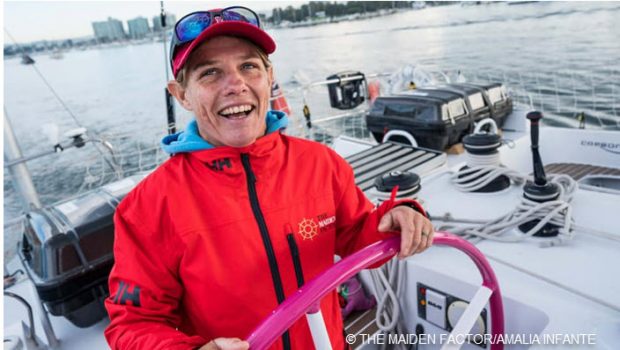


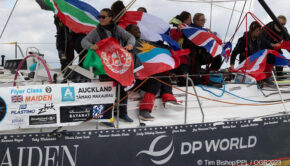
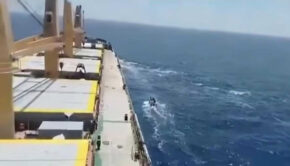
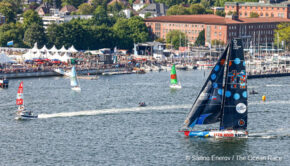
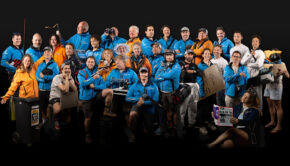
 We’ll keep your information safe.
We’ll keep your information safe.